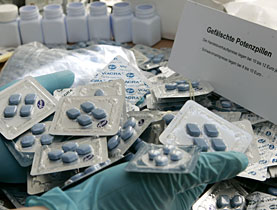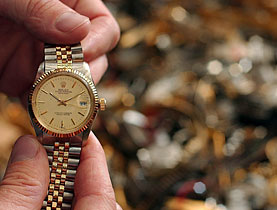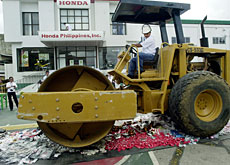EU voices concern over Swiss-seized medicine

The European Union has expressed concern at the amount of counterfeit medicine seized from Switzerland last year.
The EU annual report on customs operations published on Monday ranked Switzerland as the main source of seized fake medicines, above India and the United Arab Emirates.
The Swiss authorities say the EU report should not be a cause for alarm as the figures were based on one particular consignment of drugs.
Five shipments totalling 1.6 million morphine-based painkiller pills from Switzerland were confiscated by German customs between March and May 2007.
“I was shocked when I saw the Swiss statistics,” said EU Customs Commissioner Lászlo Kovács.
“The Swiss name carries a certain guarantee for consumers. It is therefore even more dangerous for the counterfeit products to come from Switzerland than from China.”
He said Switzerland was not only a transit country for piracy trademark drugs, but also the country of origin of such products. He added that he hoped the recent seizures would not be repeated.
Patent issue
The EU said the case was being handled by the German authorities and could concern a patent infringement.
Swissmedic, the agency responsible for ensuring only safe medicines are on the market, said it was not alarmed by the EU report as the seizures did indeed centre on a pending patent case, rather than fake goods.
Ruth Mosimann told swissinfo: “The patent case, which was the background for the EU announcement, is unique.”
But she added the report showed there had been an increase in attempted illegal imports of medicines into Switzerland, which was a “reason for concern”.
Walter Pavel, a Federal Customs Office spokesman, agreed the EU figures for Switzerland were based on a patent case instead of counterfeit medicines.
He told swissinfo: “The EU will have to prove that these products are of Swiss origin, which is not sure at this point. In the past, we have often found in similar cases that the products were not made in Switzerland.”
He added: “If the EU wants us to act, they will have to put in a request to discuss the problem with Switzerland.”
The issue is due for review during a regular meeting of the mixed customs committee between Switzerland and Brussels.
Last year customs authorities in 27 EU countries discovered a 51 per cent increase in counterfeit medicines, while piracy trademark toys were up 98 per cent and cosmetics soared 264 per cent in 2006 compared with the previous year.
Overall there were 43,000 incidents of fake goods seized within EU borders, a 17 per cent rise.
swissinfo
The EU annual report on customs operations was published on May 19. Overall, there were 43,000 incidents of fake goods seized within EU borders in 2007, a 17 per cent rise compared with the previous year. There were 79,000,000 items altogether.
China was the source for 60 per cent of all fake goods seized. Georgia was the major source of cosmetic products, Turkey provided most counterfeit foodstuffs, while Switzerland led the amount of fake medicines.
Clothes and accessories were the main counterfeit item. Numbers of fake cigarettes, CDs and DVDs were down but the EU report said internet-based piracy of copyright media was a growing problem, with users downloading films and songs without making royalty payments.
European consumers were also ordering more pirated products, such as fake Viagra, over the internet.

In compliance with the JTI standards
More: SWI swissinfo.ch certified by the Journalism Trust Initiative


You can find an overview of ongoing debates with our journalists here. Please join us!
If you want to start a conversation about a topic raised in this article or want to report factual errors, email us at english@swissinfo.ch.